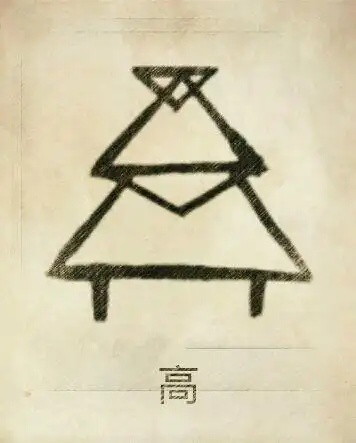The Gao(gāo) surname is one of China’s oldest and most storied family names, carrying a rich history and cultural significance. From its roots in ancient Chinese civilization to its modern-day contributions, the Gao family has played a pivotal role in shaping Chinese history and culture. This article explores the origins, historical figures, cultural significance, and social impact of the Gao surname, offering a glimpse into its enduring legacy.

Ⅰ、Origins of the Gao Surname:
1. Jiang Clan Branch:
Descendants of the legendary Emperor Yan (Shennong), the Gao family traces its lineage to Bo Yi, who was granted the title of Lü Hou for his contributions to flood control. His descendant, Jiang Ziya (also known as Lü Shang), helped establish the Zhou Dynasty. The Gao surname originated when the grandson of Duke Wen of Qi, Gao Xi, took the name from his fiefdom in Gao Yi (modern-day Yuzhou, Henan).
2. Patronymic Origin:
During the Spring and Autumn Period, the son of Duke Hui of Qi, named Qi (styled Zi Gao), had descendants who adopted "Gao" as their surname, forming another branch of the family in Shandong.
3. Ethnic Assimilation:
During the Northern Wei Dynasty, the Xianbei tribe’s Lou clan, and later the Manchu Gaojia clan during the Qing Dynasty, adopted the Gao surname during their integration into Han Chinese culture.
4. Cross-Cultural Influence:
Descendants of the Goguryeo royal family from the Korean Peninsula migrated to China, with notable figures like the Tang Dynasty general Gao Xianzhi showcasing the cultural exchange between East Asian civilizations.
Ⅱ、Historical Figures:
The Gao family has produced numerous historical figures known for their loyalty, talent, and contributions to Chinese culture:
1. Political and Military Leaders:
Gao Xi: A senior minister of Qi during the Spring and Autumn Period, he played a key role in establishing Duke Huan of Qi as a hegemon.
Gao Huan: A powerful Northern Wei official whose son, Gao Yang, founded the Northern Qi Dynasty.
Gao Minggui: A Qing Dynasty general known for his bravery and wisdom, he single-handedly persuaded rebel forces to surrender, earning the admiration of Emperor Daoguang.
2. Artistic and Intellectual Pioneers:
Gao Jianli: A renowned musician of the Warring States period, he is remembered for his poignant farewell song at the Yi River, symbolizing loyalty and sacrifice.
Gao Shi: A Tang Dynasty poet famous for his frontier poems, such as Song of the Yan Country, which captured the spirit of patriotism.
Gao E: A Qing Dynasty scholar who contributed to the completion of Dream of the Red Chamber, one of China’s greatest literary classics.
3.Cultural Integrators:
Gao Zhumeng: The founder of Goguryeo, he blended Chinese culture with Northeast Asian traditions, establishing a significant kingdom in the region.
Ⅲ、Cultural Significance:
1.Ancestral Halls and Clan Names:
The Gao family is associated with ancestral halls and clan names like "Bohai," "Guangling," and "Yuyang," reflecting their regional and moral legacy.
2.Education and Philanthropy:
During the Qing Dynasty, the Gao family in Qingcheng, Gansu, established a free school for underprivileged students, pioneering business education and nurturing numerous scholars.
3.Environmental Stewardship:
For over 300 years, the Gao family in Qingcheng has maintained the Puzhe Canal, a vital irrigation system along the Yellow River, showcasing their commitment to community and sustainability.
Ⅳ、Social Impact:
1.Population and Distribution:
Today, there are approximately 14.52 million people with the Gao surname. The surname is concentrated in Shandong, Jiangsu, and Anhui, forming a "Bohai-Southeast Coast" corridor.
2.Overseas Influence:
The Gao family has a significant presence among overseas Chinese communities, particularly in Southeast Asia. The Gao Clan Ancestral Hall in Singapore serves as a hub for transnational family networks, fostering economic and cultural ties.
3.Modern Contributions:
From architect Gao Wenjin to scientist Gao Jiyu (a pioneer in organic chemistry), the Gao family continues to make significant contributions across various fields.
Conclusion
The history of the Gao surname is an epic of loyalty, cultural integration, and innovation. From its ancient roots in the legendary Emperor Yan to its modern-day global presence, the Gao family has upheld the values of loyalty and cultural stewardship while embracing change. This 3,000-year-old legacy is a testament to the enduring spirit of Chinese civilization.